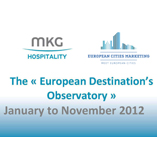The « European Destinations Observatory », January to November 2012

The weight of the crisis and the slump in business have increasingly being felt during the second half of 2012. With the notable exception of the month of August, occupancy has been stagnating and prices have stopped growing throughout European cities. At the end of November 2012, the level is barely on a par with last year’s for the same period. The Olympic effect around London has reached its limits and it is mainly thanks to the success of German destinations that the results are not lower. Of the 43 cities followed by the “European Destinations’ Observatory”, a project dedicated to ECM’s members by MKG Hospitality, only 21 continue to post growth in the RevPAR at the end of November and 9 of them are German. Moreover, growth rates registered by German cities are usually significantly higher than average.
\n
\n
Globally, hoteliers are resisting the temptation of price wars and are maintaining a noteworthy difference in the pricing of different hotel categories. Despite occupancy rates that are sometimes down, average daily rates are steady for the global gateways of Paris, London and Rome as well as for more European cities such as Copenhagen, Helsinki or Turin.
\n
The rhythm of the European economy differs from East to West, and North to South. The economic context remains globally more difficult in the South. In Italy, the drop in occupancy weighs fairly heavily on the RevPARs and all sampled Italian cities (Rome, Bologna, Florence, Milan and Venice) register negative results. Spanish cities such as Madrid, Seville and Zaragossa are also in difficulty. As a matter of fact, it is the cities in Northern Spain that are resisting best. In Central Europe, activity is mostly growing, but it is only partially making up for a drop in prices that was more significant than in previous years.
\n
One month before the end of the year 2012, perspectives were not very optimistic. The primary growth engines of 2012 – international sports events and major professional fairs – have already produced their effects. Any extension of these benefits is very unpredictable and visibility of forthcoming activity in 2013 is weak, especially since most European governments are increasing austerity measures and fiscal pressure.
\n
\n
\n
Source: MKG Hospitality: www.mkg-group.com
\n
European Cities Marketing
Flavie BAUDOT – flavie@europeancitiesmarketing.com
\n
MKG Hospitality
Orianne KIENY – o.kieny@mkg-hospitality.com
\n
\n
\n
\n